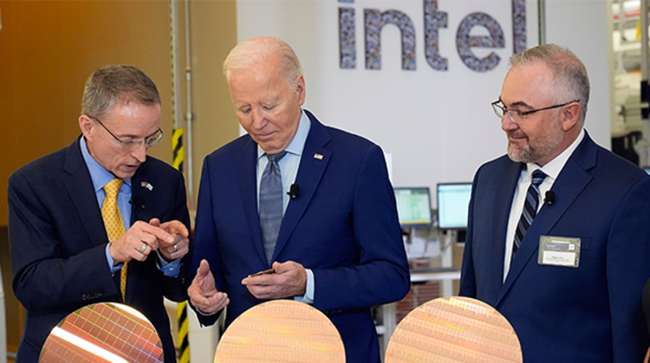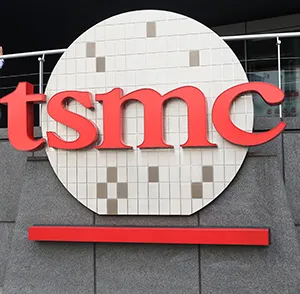Bloomberg News
Trump’s Win Sets Off Race to Complete Chip Subsidy Deals

[Stay on top of transportation news: Get TTNews in your inbox.]
The Biden administration is racing to complete CHIPS Act agreements with companies like Intel Corp. and Samsung Electronics Co., aiming to shore up one of its signature initiatives before President-elect Donald Trump enters the White House.
The Commerce Department has allocated more than 90% of the $39 billion in grants under the 2022 CHIPS and Science Act, a landmark law designed to rebuild the domestic chip industry. But the agency has only announced one binding agreement so far.
The next two months will prove critical for more than 20 companies still in the process. Some of them, including Taiwan Semiconductor Manufacturing Co. and GlobalFoundries Inc., have wrapped up negotiations and expect to make final award announcements soon, people familiar with the matter said.
Others — like Intel, Samsung and Micron Technology Inc. — are still working through some substantive details of their contracts, according to other people, who asked not to be identified because the conversations are private.
America's investments in microelectronics matter. Not only do they enable nearly every device essential to modern life, but they power our military. Through the CHIPS and Science Act, we are rebuilding American leadership in chip researching, design, and production at scale. Read… pic.twitter.com/TTlDnOZHbP — Deputy Secretary of Defense Kathleen Hicks (@DepSecDef) November 8, 2024
Officials have long aimed to square away as many deals as possible by the end of 2024, allowing funds to start flowing to companies that hit specific milestones. Trump’s victory now adds urgency to the situation because the Biden team wants to insulate its industrial policy initiatives from partisan politics. Chipmakers also want to avoid renegotiating terms with a new administration.
The CHIPS Act, which includes billions in loans and 25% tax credits in addition to the grants, has lured commitments from companies to spend around $400 billion on U.S. factories. The Democratic administration sees the bipartisan program as one of its key accomplishments, but Trump and his allies have attacked the law in recent days.
NEW: Thanks to my bipartisan CHIPS & Science Law, I am announcing that Corning Inc. has reached a $32 million agreement to expand manufacturing at their Canton plant, creating new, good-paying union jobs in the North Country!https://t.co/b6TABNXzKK — Chuck Schumer (@SenSchumer) November 8, 2024
Last month, Trump criticized the initiative as “so bad” and suggested tariffs would be a better solution. Republican House Speaker Mike Johnson then said his party would seek to “streamline” the law, as he walked back earlier remarks that Republicans would “probably” seek a repeal.
The Trump campaign hasn’t clarified its stance on the issue since the election, though the general consensus among industry lobbyists is that the CHIPS Act will remain largely intact.

TSMC's headquarters in Hsinchu, Taiwan. (Chiang Ying-ying/AP/file)
After all, it was Trump’s first administration that courted TSMC, the world’s leading chip manufacturer, to build factories in Arizona. Federal regulations also will compel his second administration to spend the CHIPS Act money appropriated by Congress, which includes the full $39 billion for direct awards through fiscal 2026.
Chips are the lifeblood of the modern economy, essential building blocks for all types of consumer and military technologies and a point of tension between Washington and Beijing. Both parties have said that domestic semiconductor production is a national security priority — particularly given the possibility of a Chinese invasion of Taiwan, the industry’s manufacturing hub.
“Clearly the election hasn’t changed the fundamental geopolitical challenge with China,” said Sujai J. Shivakumar, a senior fellow at the Center for Strategic and International Studies, a Washington-based think tank.
Compared with Biden’s other industrial policy initiatives, the CHIPS Act enjoys broad-based support. A White House spokesperson pointed to that bipartisan backing in a statement, emphasizing that the law is a cornerstone of the administration’s “commitment to America’s economic and national security.”
But Republicans could seek to strip out what they see as social priorities in the CHIPS Act — things like requirements for child care facilities or expectations that companies will consult with local labor unions and work to limit the environmental impact of their factories.
Republican staffers on Capitol Hill are already having serious conversations about pursuing such reforms as part of the budget reconciliation process next year, a GOP aide said, provided the party takes over both chambers of Congress. (Republicans have secured a majority in the Senate. Party control of the House is still up for grabs.)

Johnson
Johnson has looked specifically at streamlining environmental requirements, Bloomberg has reported, to go beyond existing permitting exemptions. Industry lobbyists, meanwhile, are planning to push for expanded tax credits as Congress gears up for major tax talks next year, people familiar with the matter said.
The concern for companies is not so much that Republican reforms would change their top-line subsidy numbers, but rather that they would further delay the funding — money that some chip executives already feel has taken too long to arrive.
A number of projects have reached their initial benchmarks, a senior administration official has said, which means the first tranches of money can be disbursed as soon as contracts are signed.
In Intel’s case, the talks hinge in part on so-called change-of-control provisions, people familiar with the matter said. Those terms spell out what would happen if the company spins off its manufacturing business or is acquired in whole or in part.
That’s a delicate subject at a time when the chipmaker faces daunting financial challenges. Bloomberg and other news outlets have reported that other semiconductor firms have prepared or are considering a bid for all or part of Intel. CEO Pat Gelsinger has vowed to keep the company together, and Intel said in a statement that it will continue to work with the Biden administration to finalize its award.

Intel CEO Pat Gelsinger has vowed to keep the company together. (Annabelle Chih/Bloomberg)
Micron, meanwhile, is resisting a requirement to join the new National Semiconductor Technology Center, a $5 billion CHIPS Act research and development initiative, other people said. Membership was a condition of the preliminary awards, and the company is one of several now balking at the terms.
Micron said in a statement that it continues to work closely with government officials to finalize its incentive package.
Then there’s Samsung, which spooked Biden administration officials last month with a financial report so disappointing it prompted a rare corporate apology. The struggling company has shown little progress against TSMC in the production of cutting-edge chips. It also has yet to announce a major customer for new facilities in Texas.
Samsung’s CHIPS Act talks have picked back up recently after a slowdown earlier this year, people familiar with the matter said. At one point this fall, according to the people, company and government officials went more than a month between due diligence meetings.
Samsung didn’t respond to a request for comment. The Commerce Department declined to comment on ongoing negotiations.
Other outstanding issues include a labor provision called Davis-Bacon, which sets prevailing wages for federally supported construction. Companies also are seeking clarity on how much business they can do with China. Last year, the Biden administration issued national security guardrails limiting how much CHIPS Act winners can expand facilities in the Asian country, but there are still specific details to work out in contracts.
Want more news? Listen to today's daily briefing above or go here for more info
The Biden administration’s goal is to reach commitments for distributing as much of the money as possible before leaving office. That would generally protect companies against any changes, barring an act of Congress or compliance failures by funding recipients.
It’s possible that Trump’s Commerce Department could try to terminate and renegotiate federal contracts that are already signed, but his team hasn’t expressed a desire to do so.
No matter what, though, Biden officials recognize that some of the final work — including actually handing out most of the money — will fall to Trump appointees.
“Our team continues to implement this bipartisan law in accordance with statute,” said a spokesperson for the Commerce Department, which unveiled two more preliminary CHIPS Act awards on Nov. 8. The agency “will have more announcements in the coming weeks,” they said.




